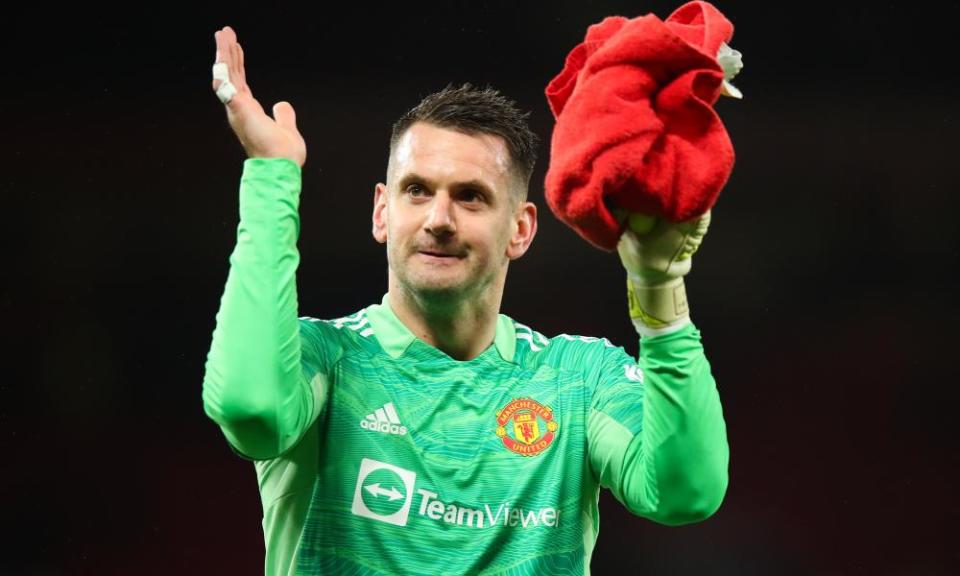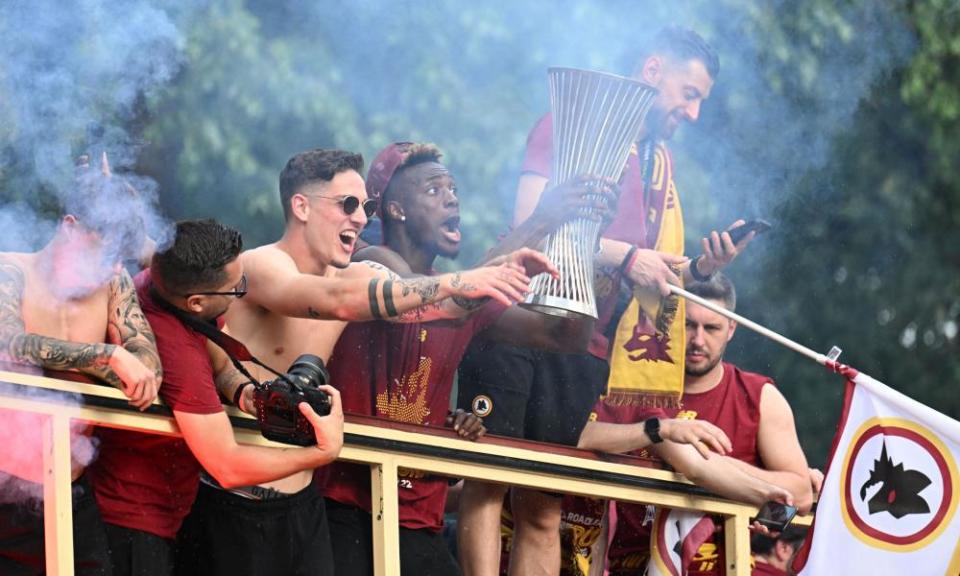Which football manager has the worst winning record in European finals?
“Jürgen Klopp’s success rate in European finals is 20% (P5 W1,L4),” notes James Smith. “Is there a manager with a worse record that has played a similar number of European finals?”
Yes, is the short answer – but the Liverpool manager is in good company with one Champions League final win from four. And remember, you’ve got to get to so many finals in the first place to even be considered for this. Over to Dirk Maas: “Klopp has equalled Marcello Lippi’s feat during his spells with Juventus in the 1990s and 2000s. Arsène Wenger and Héctor Cúper, meanwhile, were left empty-handed from their three finals in a major Uefa club competition.”
Wenger is the king of the 0% club: the only coach to lose a final in all three of Uefa’s traditional tournaments: the Cup Winners’ Cup with Monaco (1992, lost to Werder Bremen) and with Arsenal, the Champions League (2006, lost to Barcelona) and Uefa Cup (2000, lost to Galatasaray). As for Cúper, he lost back-to-back Champions League finals with Valencia in 2000 and 2001, to Real Madrid and Bayern Munich, respectively. The Argentinian also fell short in the 1999 Cup Winners’ Cup final with Real Mallorca, losing 2-1 to Lazio after beating Chelsea in the semi-finals.
Dirk can add another eight managers that lost both their major Uefa finals – with some familiar names, and some less so familiar:
Albert Batteaux (Reims, European Cup 1956 and 1959)
Scot Symon (Rangers, Cup Winners’ Cup 1961 and 1967)
Cestmir Vycpalek (Juventus, Fairs Cup 1971 and EC 1973)
Georg Kessler (AZ Alkmaar, Uefa Cup 1981; Köln, UC 1986)
Otto Baric (Rapid Vienna, CWC 1985; Salzburg, UC 1994)
Roy Hodgson (Inter, UC 1997; Fulham, Europa League 2010)
Jorge Jesus (Benfica, EL 2013 and 2014)
Massimiliano Allegri (Juventus, CL 2015 and 2017)
Never too late
“Who was the oldest player to get signed for the first time by the club they supported as a child?” tweeted Bevan McCabe.
“Steve Claridge joined Portsmouth at the ripe old age of 32,” notes Edward Reynolds. “He went on to became player-manager in 2000 at 34, so could also be one of the youngest managers to lead his home town club.”
“I offer Chris Waddle, boyhood Sunderland fan, who finally signed for the Black Cats in March 1997 at the age of 36 years and three months,” writes Chris Charlton-Matthews. “He played seven games and was involved in every goal Sunderland scored for the rest of the season, scoring a belter of a free-kick in the last ever game at Roker Park. Sadly still not enough to keep us up, but a privilege to watch a master at work.”
Richard Powell offers Paul Jones: “He was 36 years and eight months old when he signed on an emergency loan deal for Liverpool in January 2004. Indeed, the Wales keeper jumped at the chance when he got a call from Gérard Houllier. “It was just a no-brainer,” Jones said in 2020. “The opportunity to play for Liverpool – I don’t care if it’s one game.” In the end, it was two – but he kept a clean sheet at Anfield in a 1-0 win over Aston Villa.

There are two Manchester United keepers also worthy of mention. Tom Heaton made his first-team debut as a substitute at the age of 35 in December 2021, having first played for the academy side aged 14. Lee Grant was also 35 when he made his United debut as a substitute, and made his full debut in November 2019, “fulfilling a boyhood dream” at 36 years and 10 months.
But wait – Jack Hart has an even older outfield debutant. “Teddy Sheringham signed for West Ham in 2004, at the age of 38 years and three months.” The veteran striker netted 21 Championship goals to help the Hammers back into the top flight. “To have the chance to play for my boyhood club, even though I was probably past my best – I was very pleased to do that,” he said.
• Any more for any more? Mail us or tweet @TheKnowledge_GU.
Continental trophies only
“Tammy Abraham has won the Champions League, Super Cup and Europa Conference League, but has no top-tier domestic titles,” notes Rob Lawshaw. “Which player has the most continental titles without a domestic one?
“Abraham joins Juan Mata (one Champions League, two Europa Leagues), Dino Baggio (three Uefa Cups), and Coke (three Europa Leagues),” writes Chai from Atlanta. “Taking this achievement a step further are two players. Spanish midfielder Vicente Iborra, part of Sevilla’s three consecutive Europa Leagues from 2013-16, won the trophy again with Villarreal. Also, Argentinian midfielder Éver Banega won the Copa Libertadores with Boca Juniors before winning three Europa Leagues with Sevilla. However, neither player has won a domestic league yet.”
However, if we’re looking for players who have won three different continental trophies without a domestic top-tier title, we can think of only Steven Gerrard (Champions League, Uefa Cup, Super Cup) as a companion for Abraham’s feat. If we narrow it down to continental trophies and no domestic ones at all (FA Cup, League Cup, Coppa Italia etc) then Abraham may well be on his own.

Corrections corner
Last week, we added Nigel Spink to our list of Cup final debutants. Tim Hoult (and others) got in touch to point out that Aston Villa’s greatest night was actually the young keeper’s second appearance for the club. “He started for the first time on Boxing Day 1979 and shipped two goals in a defeat against Brian Clough’s Nottingham Forest, who were then the European champions.” Spink had to wait another two-and-a-half years for a second chance, in the 1982 European Cup final.
Knowledge archive
“Have a husband and wife ever been sent off in the same match?” wondered Steve Turner back in 2010.
Indeed they have. Back in December 1999 Bristol Rovers were taking on Oxford United in the South-west Women’s Combination league. Midway through the match an Oxford player appeared to handle the ball, but the referee was unmoved. A livid Mandy Gornicki-Bond furiously protested, and was promptly shown a red card, despite her insistence that her remarks had not been directed at the official.
The decision infuriated the Rovers manager, who just happened to be Mandy’s husband, Bill. Angered by the perceived injustice he strode on to the pitch to confront the official. Bill, a policeman and class one referee, later insisted he had not been abusive, but he too was sent to the stands.
Can you help?
“Knowing their love for Watford, has an Elton John song ever been played at Luton’s Kenilworth Road?” wonders Edward Jones.
“Is Real Madrid’s Gareth Bale the most expensive unused substitute in a European Cup final ever?” asks Albert from Vienna.
Newell's have had 4 captains against San Lorenzo tonight!
1. Pablo Pérez (inj 15' mins)
2. Cristian Lema (red 62' mins)
3. Julián Fernández
4. Leonel Vangioni (given the armband by Fernández when he came on as a 77' minute sub)
Has there been more in 1 match? @TheKnowledge_GU— Jamie Ralph (@ModernLepra) June 10, 2022
“Andreas Weimann scored his first senior Austria goal against France last week at the age of 30,” notes Niall McVeigh. “Are there any players who were older when breaking their international duck?”
Hey there @OptaJoe @TheKnowledge_GU, when #gtfc start the season on July 30th, will they become the first club to play competitive league matches for twelve consecutive months?
— Cod Almighty (@codalmighty) June 11, 2022
“Are League Two returnees Grimsby the first team to be promoted via the playoffs having been behind in every game?” asks Mike Slattery.
Newell's have had 4 captains against San Lorenzo tonight!
1. Pablo Pérez (inj 15' mins)
2. Cristian Lema (red 62' mins)
3. Julián Fernández
4. Leonel Vangioni (given the armband by Fernández when he came on as a 77' minute sub)
Has there been more in 1 match? @TheKnowledge_GU— Jamie Ralph (@ModernLepra) June 10, 2022
Mail us your questions or tweet @TheKnowledge_GU.

 Yahoo Sport
Yahoo Sport 





































